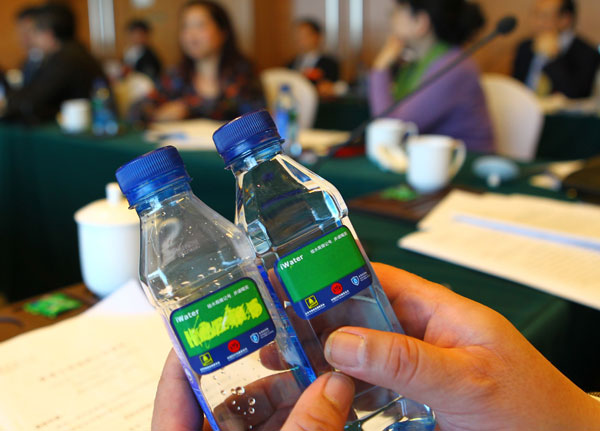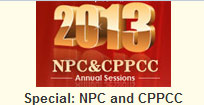Efficient sessions become more practical
Updated: 2013-03-14 07:36The efficiency of the two sessions has improved a lot this year and the conferences have become more effective and practical, political advisers and lawmakers said.
The Chinese People's Political Consultative Conference, which began on March 3 and ended on Monday, and the National People's Congress, which lasts from March 5 to 17, have won applause from delegates.
 |
|
Mineral water provided during the two sessions this year carry tags that read "Please finish the whole bottle of water", part of efforts to crack down on extravagance and waste. Zou Hong / China Daily |
"In the past, the CPPCC usually lasted for about 12 to 13 days, yet this year it was shortened to nine days, with a more efficient and tight schedule. All of the participants in our group have made their speeches brief, yet inspiring, saving a lot of time," said Zhou Bohua, a CPPCC National Committee member and head of the State Administration for Industry and Commerce.
"And because the number of banquets has been greatly reduced during the two sessions this year, the political advisers and lawmakers can invest more energy in the discussion of proposals and comparing notes, which benefits improving the efficiency of conferences. All of these changes convey a positive sign of a more practical and effective government leadership," Zhou said.
Ge Jianxiong, a CPPCC National Committee member and the president of Fudan University library in Shanghai, said the two sessions this year convey a positive sign that the central government is focusing on improving effectiveness and productivity.
|
 |
"For instance, compared with before, the government issued fewer parking permits for vice-ministers this year, so the vice-ministers chose to take buses to attend the meetings in the Great Hall of the People instead of driving their own cars," Ge said.
"There are also fewer road closures to make travel more convenient for NPC deputies and CPPCC National Committee members this year. All of these changes demonstrate that the government is getting more practical and productive with less ostentation," Ge said.
Yan Shiyuan, a CPPCC National Committee member and minister of the United Front Department of the Shandong Committee of the Communist Party of China, said that the two sessions have improved in saving costs, such as reducing the printing of paper documents by releasing some documents online, a "more environmentally friendly" way.
According to the country's top political advisory body, 5,641 proposals had been submitted by CPPCC National Committee members by 2 pm on March 7, about half of which were submitted via the Internet.
Wan Baonian, a CPPCC National Committee member and deputy director of the Institute of Plasma Physics at the Hefei Institutes of Physical Science of Chinese Academy of Sciences, pointed out that political advisers have discussed the issues more interactively and in-depth this year.
"Unlike before, when political advisers gave their speeches on different topics one after another with no discussion, they began to debate and discuss certain topics this year. The results are more fruitful," Wan said.
Despite the improvement in cost savings and enhanced productivity, there is still desire for the two sessions to address national interests and appeals from the people for more efficiency.
"People have higher expectations than just being economical and controlling the sessions' budgets. They care more about what changes and real effects the sessions are going to make," said Ge with Fudan University.
"I think legislators and political advisers should spend different amounts of time and energy on different topics. There is never too much discussion of some key topics and issues, such as the State budget. But the time spent on this topic now is far from enough," said Ge.
Yu Minhong, a CPPCC National Committee member and the president of New Oriental Group, said that there is progress, yet some procedures can be changed to improve efficiency further.
"For instance, as for the CPPCC National Committee members' group discussion, the political advisers can be divided into different groups based on their proposals so they can discuss some topics in greater depth," said Yu.
Contact the writers at huhaiyan@chinadaily.com.cn, hedan@chinadaily.com.cn and wuwencong@chinadaily.com.cn


